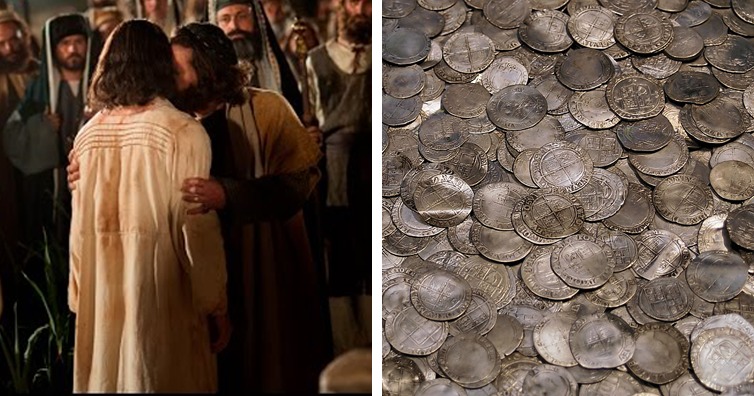Approximately 1980 years ago, Judas Iscariot received the most notorious sum in the history of mankind: thirty pieces of silver to betray Jesus Christ.
Of course, Judas ended up regretting it and returned the money before hanging himself. Yes, we all know the story, but have you ever wondered how much were those thirty pieces of silver worth in today’s money?
Well, because these questions do make sense for all of use useless info junkies out there, we did a small research and here are our findings. (the article continues after the ad)
WHY THERE’S A NEED FOR YET ANOTHER “RESEARCH”
If you do a Google search, you’ll find a lot of articles answering this very question. So, why not just use those findings? Well, because in my humble opinion, all of them are trying to answer the question by focusing on wrong parts of the equation.Some say that if you want to buy one of those pieces of silver today, you’ll need about 200$-500$, hence thirty of them are worth around 6,000-10,000$. Others suggest that because one of those coins weighed 14 grams and contained 94% silver, given the current silver valuation, thirty pieces are now worth between $185 and $216. Okay, i’m sure all of them are correct in calculations but they miss the most important element: purchasing power.
WHAT WE SHOULD INVESTIGATE TO ANSWER THIS QUESTION
Simply said, what we should be looking is for the purchasing power of the thirty pieces of silver – what Jews could have bought with the money.
WHAT CURRENCY WERE THE THIRTY PIECES OF SILVER
Historians tend to agree that most probably, Judas was paid in Tyrian Shekel. This coin right here:
This is because the Tyrian shekel was the currency used during the era to pay for the Temple tax in Jerusalem. The Temple Tax was worth a half-shekel and was paid by any Jewish male over 20 years of age (the money was used for the maintenance of the temple). That being said, it’s believed that the tax was not a large sum of money as it was the equivalent of a two day’s salary.
So, if half a shekel was two days’ salary, one shekel was four days’ salary and therefore, 30 shekels were worth 120 days’ salary. That was the purchasing power of the sum.
SO, HOW ARE 120 DAYS OF WORK WORTH TODAY?
Now that we have a common base (a day’s salary) we need to get this into today’s money. Of course, this varies widely across countries, so we’ll take the U.S. as an example. According to the Bureau of Labor Statistics (BLS), the United States’s median wage in the 4th quarter of 2017 was $44,564 per year or $857 per week for a 5-day, 40-hour workweek. This translates to roughly $170 per day.
So, if the average US salary is $170 per day and thirty pieces of silver are work 120 days’ salary, then the purchasing power of the coins was the equivalent of $20,400! In other words, if the transaction was to take place today, Judas could have bought a brand new mid-level car with that money.
That’s quite a sum!
If you like what you read, then you will definitely love this one: How Much Weight Would Santa Claus Gain From Consuming Cookies And Milk At Every House?
Photo: www.lds.org, Wikimedia
Photoshop: I’m A Useless Info Junkie
Sources: The Tyrian Shekel and the Temple of Jerusalem | Tyrian Shekel | What is the temple tax? | Average Salary Information for US Workers

